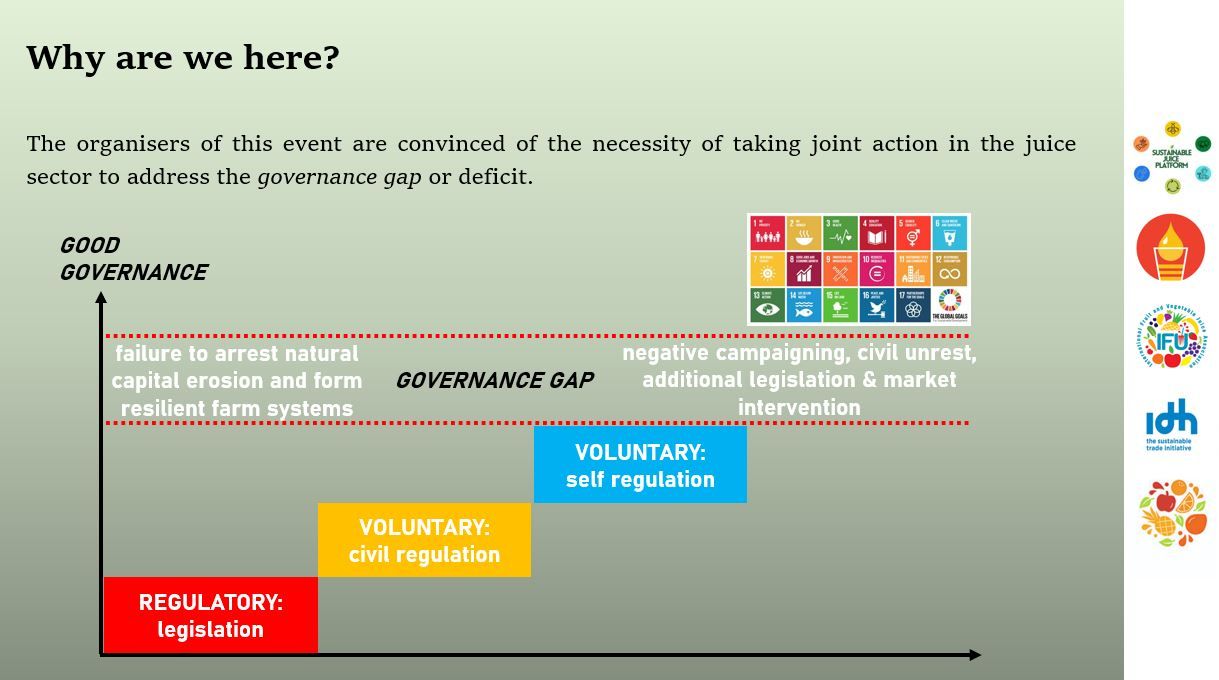Juice Environmental Summit – a starting point for sector-wide cooperation
2022-03-31
Being an agricultural processing sector, our supply chains heavily rely on well-functioning eco-system services. Consequently, the fruit juice industry has direct interests in addressing environmental risks. Many companies are already taking steps on their own but it’s not easy to act in an impactful, credible and affordable way, which raises the event’s primary question: how can we, as an industry, continue to ensure that our efforts are aligned and that our actions indeed result in the required positive change?
The Juice Environmental Summit was the first time that a large number of stakeholders from across the fruit juice value chain were present at once to tackle these questions. The event’s organisers believe that sector-wide cooperation is key to effectively address these challenges. Astrid Baeten, Program Manager of the Sustainable Juice Covenant pointed out that „if our sector sets common ambitions, we create a level of playing field while increasing credibility, sharing learnings, reducing costs and making a bigger impact.”

The objectives of the Juice Environmental Summit were to familiarise industry players with the environmental risks and impacts associated with the juice sector; to explore some of the pathways for engagement; to identify focus areas for collaborative efforts; and to develop concrete next steps. To set the final agenda of the Summit, registrants were asked prior to the event to indicate which topics they consider to be priorities for the fruit juice industry in terms of environmental sustainability. Four key topics emerged: developments in sustainability legislation, GHG emissions, packaging and water management.
Wim Debeuckelaere, Policy Officer at the European Commission (DG SANTE), working on the implementation of the Farm to Fork Strategy, kicked off the presentations and provided an overview of the European Union’s current initiatives and legislative frameworks in place that aim to guide agri-food sectors towards building an increasingly sustainable food system. Mr Debeuckelaere mentioned the ‘EU Code of Conduct on responsible food business and marketing practices’ as an example of institutionally encouraging multi-stakeholder cooperation when addressing sustainability: “The EU Code of Conduct aims to tangibly improve the environmental and social performance of the food industry while seeking timely commitments from companies to take concrete actions on improving food sustainability regarding the health, environmental and social performance of their products.”
What sort of actions should responsible companies take to address climate change and to work towards reducing emissions? Agriculture and land use are responsible for 24% of global greenhouse gas emissions (IPCC, 2019). Over half of GHG emissions are not associated with the juice sector, however, our industry’s efforts are crucial to reach the EU’s ambitious net zero target by 2050. There are, in fact, several tools available for companies to calculate their emission footprints. These mechanisms are designed not only to determine a company’s footprint, but also to enable identifying priority areas for carbon reduction.
Owen Hewlett is the Chief Technical Officer of the Gold Standard Foundation, an international organisation that issues voluntary carbon credits. The Gold Standard Foundation’s goal is to maximise impact by ensuring that projects that involve reduced carbon emissions feature the highest levels of environmental integrity and contribute to sustainable development. “The existing frameworks help us understand whether companies are taking responsibility or not” – said Mr Hewlett. He cautioned the audience, however, that establishing an environmental target is only the beginning of the journey: “setting a science-based target doesn’t make you good; it puts you on the pathway to become good and to take responsibility the right way.”
At a time of growing consumer awareness and demand for sustainability, packaging companies have a huge responsibility to design products with a smaller environmental footprint. Norman Gierow, Head of Marketing Europe at SIG Combibloc provided a glimpse of how the beverage carton industry and the fruit juice industry can support each other in delivering on environmental ambitions. Mr Gierow showcased ‘The Beverage Carton Roadmap to 2030 and Beyond’ project, which is a sector-wide sustainability initiative that established clear targets - with firm KPIs - for beverage carton manufacturers. The Roadmap, coordinated by ACE – The Alliance for Beverage Cartons and the Environment, is fully aligned with the EU Green Deal’s objectives while not compromising on health and safety standards for consumers.
During the final presentation of the Summit, another roadmap was introduced: ‘A Roadmap Towards Water Security for Food and Drink Supply’. Sophie Harrison, GHG Sector Specialist at WRAP UK and Conor Linstead, Freshwater Specialist at WWF emphasised the importance of tackling water risks through collective action as climate change is visibly contributing to water scarcity. WRAP UK’s Roadmap sets out a vision and key pathways to address the challenges we collectively face in protecting critical water resources for food supply, for nature and for local communities. The vision of the Roadmap is that, by 2030, 50% of the UK’s fresh food is sourced from areas with sustainable water management.
In conclusion of the event, participants agreed that these environmental risks cannot be tackled without industry collaboration due to their complexity. Knowledge sharing, common ambitions and joint investments are key to building a sector-wide approach successfully. To help your company or organisation set an environmental agenda, here are a few tips from the organisers where to start:
- Identify the topic that you want to address;
- Map your stakeholders and analyse their needs and/or demands;
- Determine your scope of action;
- Define the concrete action that you would like to take.
Thank you to all the speakers and participants for their openness, transparency and support for collective action. The next edition of the Juice Environmental Summit is scheduled to take place in September 2022 on two other priority topics that have been identified by participants: biodiversity loss and waste management.
Missed the event and interested to know more? Reach out to Marton Gellert at marton.gellert@aijn.eu.
